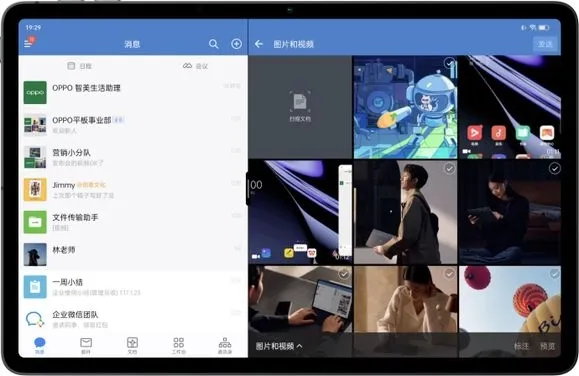After Xiaomi and Realme, OPPO has become the latest Android OEM to join the tablet league. Alongside the new Find X5 flagship lineup, the Chinese OEM has unveiled its first Android tablet called OPPO Pad. It’s a premium tablet featuring an 11-inch high refresh rate display with stylus support, flagship Snapdragon chipset, powerful speakers, and more.
OPPO Pad: Specifications
| Specification | OPPO Pad |
|---|---|
| Dimensions and Weight |
|
| Display |
|
| SoC |
|
| RAM and Storage |
|
| Battery & Charging |
|
| Rear Camera |
|
| Front Camera |
|
| Ports |
|
| Connectivity |
|
| Other features |
|
| Software |
|
The OPPO Pad’s design takes inspiration from the Apple iPad Air. The tablet has a metal frame and frosted glass back with rounded corners. The single camera sensor and an LED flash module are placed in the upper right corner, while the OPPO logo is imprinted in the center. The front is occupied by a large 11-inch display with narrow bezels all around. It’s an LCD LTPS panel with 2560 x 1600 resolution, a 120Hz refresh rate, and HDR10 support.

The OPPO Pad is powered by Qualcomm’s Snapdragon 870, the same chipset that also powers the Xiaomi Pad 5 Pro and Huawei MatePad Pro (10.8-inch). The chipset is paired with 6GB/8GB LPDDR5 RAM and 128GB/256GB UFS 3.1 flash storage. You’ll find a 13MP f/2.2 main camera on the back while selfie and video calling duties are handled by an 8MP front camera embedded into the right bezel.

The tablet supports OPPO Pencil, which offers 4096 levels of pressure sensitivity, 240Hz sampling rate, and 360-degree incognito touch. The stylus can be used for taking notes and drawing, and it charges wirelessly through the tablet. OPPO also offers a smart external keyboard that magnetically connects to the tablet.

The OPPO Pad runs ColorOS for Pad. The software is based on ColorOS 12 but comes with added productivity features and optimization to take advantage of the tablet’s big screen. You can run two apps side by side, open apps in floating windows, open two instances of the same app in parallel windows, quickly transfer files between your OPPO phone and tablet, and more.




The tablet boasts powerful quad speakers featuring a 2.00cc super-large sound chamber and Dolby Atmos support. It packs an 8,360mAh battery with 33W fast charging support. Other notable highlights of the OPPO Pad include face unlock support, Wi-Fi 6, Bluetooth 5.1, and USB Type-C port.
Pricing & Availabiltiy
The OPPO Pad comes in three colors: Black, Silver, and Purple. The base model with 6GB RAM and 128GB storage is priced at CNY 2,299 ($363) while the top 8GB/256GB variant costs CNY 2,999 ($474). Meanwhile, the OPPO Pencil and smart magnetic keyboard will retail at CNY 499 and CNY 399, respectively. The tablet will go on sale in China starting March 3. There’s no word on when the new tablet will make its way to international markets.
The post OPPO’s first Android tablet offers a 120Hz display, Snapdragon 870, and stylus support appeared first on xda-developers.
from xda-developers https://ift.tt/Qn9rU3L
via IFTTT

Aucun commentaire:
Enregistrer un commentaire